 |
|
Highlights from Tuesday, 6 March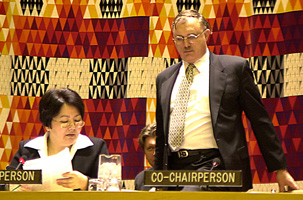
The
CSD-9 Inter-sessional Ad Hoc Working Group on Transport and Atmosphere
commenced its work on Tuesday at the UN Headquarters in New York
and is expected to conclude its work on Friday, 9 March 2001. Delegates
convened in a morning session and heard an opening statement, elected
the Co-Chair of the Working Group and adopted the agenda. They considered
the Secretary-General's report on transport and adjourned at 1:00
pm. CSD-9
Vice-Chair Madina Jarbussynova (Kazakhstan) opened the meeting and
addressed the election of officers. David Stuart (Australia) was
elected as Co-Chair of the Working Group. Co-Chair Stuart introduced,
and delegates adopted, the agenda (E/CN.17/ISWG.1/2001/1)..
Above
photo: CSD-9 Vice-Chairs Madina Jarbussynova (Kazakhstan) and David
Stuart (Australia) .
ENB
Coverage of the Ad Hoc Open-Ended Intergovernmental Group
of Experts on Energy and Sustainable Development met in New York
from 26 February to 2 March 2001
|
|
|
ENB
Daily Report
|
| Day |
HTML
 |
PDF
 |
TXT
 |
| Mon |
 |
 |
 |
| Tue |
|
|
|
| Wed |
|
|
|
| Thurs |
|
|
|
| Fri |
|
|
|
| Summary |
|
|
|
|
*
To view PDF files, you will need the free Adobe Acrobat
Reader:

*
To listen to Real Audio files, you will need the free Real
Audio player:

|
|
|
| |
 Co-Chair
David Stuart's opening remarks. He said the inter-sessional
working groups should be recognized as preparatory meetings for the
CSD-9 with a view to achieving tangible, action-oriented results.
He announced that two documents would be produced, a Co-Chairs' summary
of all statements and a compilation of elements for a draft decision
on the issues of transport and atmosphere
Co-Chair
David Stuart's opening remarks. He said the inter-sessional
working groups should be recognized as preparatory meetings for the
CSD-9 with a view to achieving tangible, action-oriented results.
He announced that two documents would be produced, a Co-Chairs' summary
of all statements and a compilation of elements for a draft decision
on the issues of transport and atmosphere |
 JoAnne
DiSano, Director, Division for Sustainable Development,
introduced the report of the Secretary-General on transport (E/CN.17/2001/3).
She said that although the ability to transport goods and services
is necessary for economic development, emissions pose a threat to
health and the environment. She warned that meeting the rising demand
for transport could involve high costs, and said that transport
investment decisions can promote sustainable development, if undertaken
with consideration to land-use regulations. She highlighted, inter
alia, the successful promotion of non-motorized transport, the
transport needs of the poor and the phasing out of leaded petrol.
JoAnne
DiSano, Director, Division for Sustainable Development,
introduced the report of the Secretary-General on transport (E/CN.17/2001/3).
She said that although the ability to transport goods and services
is necessary for economic development, emissions pose a threat to
health and the environment. She warned that meeting the rising demand
for transport could involve high costs, and said that transport
investment decisions can promote sustainable development, if undertaken
with consideration to land-use regulations. She highlighted, inter
alia, the successful promotion of non-motorized transport, the
transport needs of the poor and the phasing out of leaded petrol.
|
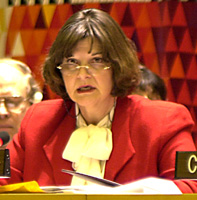
|
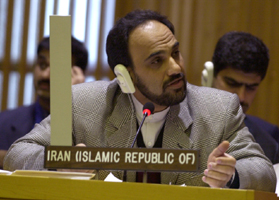 |
 Iran,
on behalf of the G-77/China,
described transport difficulties associated with urban populations,
stating that low-income families are particularly affected. Noting
that more efficient technologies are expensive, he said widespread
efforts to transfer these technologies to developing countries have
not been undertaken and that the process has to be preceded by capacity
building. He emphasized the importance of taking a gender-sensitive
approach, as women's travel tends to focus on household needs. He
noted that international trade and foreign direct investment require
an efficient international transport system, and warned against
the costs of environmental standards and difficulties with applying
economic incentives.
Iran,
on behalf of the G-77/China,
described transport difficulties associated with urban populations,
stating that low-income families are particularly affected. Noting
that more efficient technologies are expensive, he said widespread
efforts to transfer these technologies to developing countries have
not been undertaken and that the process has to be preceded by capacity
building. He emphasized the importance of taking a gender-sensitive
approach, as women's travel tends to focus on household needs. He
noted that international trade and foreign direct investment require
an efficient international transport system, and warned against
the costs of environmental standards and difficulties with applying
economic incentives.
|
|
The US and
the Russian Federation
 The US
(left) said the work undertaken by the Intergovernmental Panel
on Climate Change (IPCC) helps clarify and understand the local
and regional effects of climate change. He highlighted actions undertaken
by the US to tackle air pollution, including developing hybrid vehicles
and supporting voluntary programmes for energy efficiency in homes.
The US
(left) said the work undertaken by the Intergovernmental Panel
on Climate Change (IPCC) helps clarify and understand the local
and regional effects of climate change. He highlighted actions undertaken
by the US to tackle air pollution, including developing hybrid vehicles
and supporting voluntary programmes for energy efficiency in homes.
|
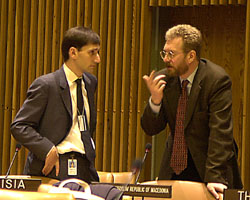
|
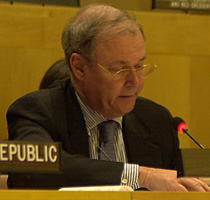 |
 Sweden,
on behalf of the EU, stressed the need for more sustainable
transportation trends, and called for a more integrative approach
to transport planning. He emphasized that poor quality transport
and lack of access constrain development in many countries, which
is exacerbated by population growth and urbanization. He stated
that price-based policies can give consumers and industries incentives
to change unsustainable transport patterns, and drew attention to
the European Commission's framework for fair pricing. He highlighted
equitable access for women and people with special needs, the polluter-pays-principle,
non-car transport and the removal of lead from petrol. He recognized
the role of global and regional bodies in promoting more sustainable
transport and emphasized the role of the business sector and NGOs.
Sweden,
on behalf of the EU, stressed the need for more sustainable
transportation trends, and called for a more integrative approach
to transport planning. He emphasized that poor quality transport
and lack of access constrain development in many countries, which
is exacerbated by population growth and urbanization. He stated
that price-based policies can give consumers and industries incentives
to change unsustainable transport patterns, and drew attention to
the European Commission's framework for fair pricing. He highlighted
equitable access for women and people with special needs, the polluter-pays-principle,
non-car transport and the removal of lead from petrol. He recognized
the role of global and regional bodies in promoting more sustainable
transport and emphasized the role of the business sector and NGOs.
|
 Nigeria said local production is minimal and not affordable
in developing countries and called for technology transfer. He noted
private funds alone are not sufficient to support transport development
in developing countries and called for capacity building and transfer
of knowledge on emissions control.
Nigeria said local production is minimal and not affordable
in developing countries and called for technology transfer. He noted
private funds alone are not sufficient to support transport development
in developing countries and called for capacity building and transfer
of knowledge on emissions control. |
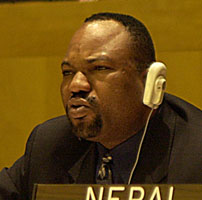
|
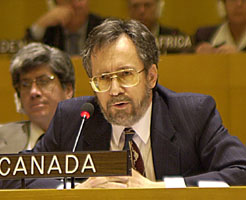 |
 Canada
underscored the importance of air transport for the provision of
food to remote populations. He suggested evaluating the environmental
impacts of actions and policies at all levels of decision making
and when monitoring and analyzing transport data. He supported behavioral
and technological changes and provision of awareness-raising programmes.
Canada
underscored the importance of air transport for the provision of
food to remote populations. He suggested evaluating the environmental
impacts of actions and policies at all levels of decision making
and when monitoring and analyzing transport data. He supported behavioral
and technological changes and provision of awareness-raising programmes.
|
|
Citing its geographical
location, Chile expressed interest in issues relating to
maritime transport, including potential environmental risks, the
health risk to coastal populations and the sustainability of the
Antarctic and sub-Antarctic ecosystems. He proposed restrictions
on the movement by sea of radioactive waste, not only dangerous
substances.
|
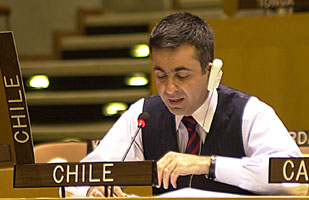
|
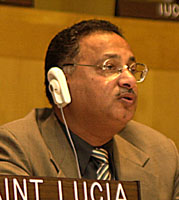 |
 Saudi
Arabia called for: an affordable transportation system for
developing countries; low costs in international transport to enable
developing countries to transport goods; new and additional resources;
the elimination of subsidies in the nuclear and coal energy sectors
in developed countries; and a halt to nuclear waste transportation
to developing countries.
Saudi
Arabia called for: an affordable transportation system for
developing countries; low costs in international transport to enable
developing countries to transport goods; new and additional resources;
the elimination of subsidies in the nuclear and coal energy sectors
in developed countries; and a halt to nuclear waste transportation
to developing countries.
|
 Australia
outlined its planned strategies relating to transport and said capacity
building is a practical tool for achieving a sustainable transportation
system. She said Australia supports the national and regional policy
options outlined in the Secretary-General's report, as well as the
Commission's flexible approach to realizing an efficient transport
system. She called for a policy that is consistent with other CSD
issues on atmosphere and energy.
Australia
outlined its planned strategies relating to transport and said capacity
building is a practical tool for achieving a sustainable transportation
system. She said Australia supports the national and regional policy
options outlined in the Secretary-General's report, as well as the
Commission's flexible approach to realizing an efficient transport
system. She called for a policy that is consistent with other CSD
issues on atmosphere and energy. |
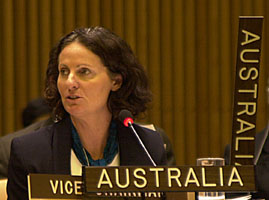
|
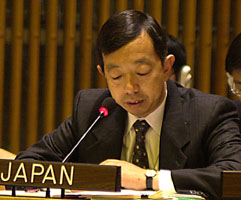 |
 On the elements
for a draft decision on transport, Japan
underscored the need to improve the capacity in many countries
to gather, compile and analyze data using modern information technologies.
He highlighted national and regional policy options, including: incorporating
sustainability criteria in infrastructure development decisions; educating
the public on the local and global environmental effects of transportation
mode choice; promoting the movement of goods that make use of more
efficient modes of transportation; cooperating on improving data collection,
compilation and analytical capabilities, and methodologies in the
transport sector; and continuing and strengthening, where necessary,
existing cooperation mechanisms in the transport sector, especially
in maritime and air transport.
On the elements
for a draft decision on transport, Japan
underscored the need to improve the capacity in many countries
to gather, compile and analyze data using modern information technologies.
He highlighted national and regional policy options, including: incorporating
sustainability criteria in infrastructure development decisions; educating
the public on the local and global environmental effects of transportation
mode choice; promoting the movement of goods that make use of more
efficient modes of transportation; cooperating on improving data collection,
compilation and analytical capabilities, and methodologies in the
transport sector; and continuing and strengthening, where necessary,
existing cooperation mechanisms in the transport sector, especially
in maritime and air transport. |
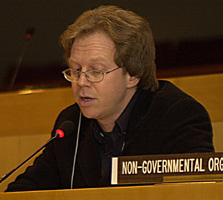  The NGO Caucus on
Sustainable Transport said
the
fact that developed countries remain the greatest contributors
to greenhouse gas emissions despite having the most advanced technologies
indicates that a focus on transport technologies alone is unlikely
to address the fundamental causes of rapidly growing transport
sector emissions. He suggested discussing: measures to facilitate
the internalization of social and environmental costs of transport
services; mechanisms for facilitating the successful commercial
acceptance of pre-existing, yet environmentally sustainable technologies
in a developing country context; and road safety issues. He contrasted
demands and consumption with technological measures.
The NGO Caucus on
Sustainable Transport said
the
fact that developed countries remain the greatest contributors
to greenhouse gas emissions despite having the most advanced technologies
indicates that a focus on transport technologies alone is unlikely
to address the fundamental causes of rapidly growing transport
sector emissions. He suggested discussing: measures to facilitate
the internalization of social and environmental costs of transport
services; mechanisms for facilitating the successful commercial
acceptance of pre-existing, yet environmentally sustainable technologies
in a developing country context; and road safety issues. He contrasted
demands and consumption with technological measures.
|
|
RELATED
LINKS
Past
IISD Coverage:
|
|